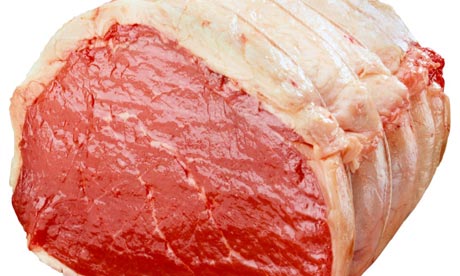Dead cow carcasses “resurrected” to produce cloned beef
We already know that cloned beef has entered the food supply both in the United States and the UK. Now, thanks to revelations from JR Simplot, a U.S. company specializing in the cloning of cows for beef production, we’re learning that dead cows are cloned to produce the next generation of beef cattle.
Here’s how it works: A large number of cows are slaughtered and then chopped into steaks that are tested for their flavor, texture and other qualities important to steak eaters. The source animal of each steak is recorded, and cells from that source carcass are preserved for possible cloning in case the steak turns out to taste good. Once all the steaks are gauged for their desirability, the dead cow carcasses from which the flesh was cut to produce the steaks are harvested for their DNA.
This DNA is then used to clone new cows who are fed, raised and slaughtered to see how their flesh steaks taste. This cycle is repeated through multiple generations in order to “evolve” cow clones with great-tasting flesh.
“The animals are hanging on a rail ready to go to the meat counter,” JR Simplot employee Brady Hicks (yes, that’s his real name) told BBC News (http://www.bbc.co.uk/news/science-e…). “We identify carcasses that have certain carcass characteristics that we want, but it’s too late to reproduce the genetics of the animal. But through cloning we can resurrect that animal.”
This “bovine resurrection,” it turns out, is just the latest mad science idea from an industry that recognizes no value in the life of a cow but tremendous value from its dead carcass.
Frankenfood beef
The upshot of all this is that the beef people are buying and eating in the US and UK right now could be from cow clones raised from the dead carcasses of other cows whose DNA were harvested for cloning. Yep: Only in the food industry do you see this sort of Frankenstein science — trying to create life from dead body parts through a process they call “resurrection”… and then serving up Frankenfoods to consumers.Far from the world of live foods, beef products are dead food made from dead cows that were given life by taking dead cells from the carcasses or other dead cows who were only kept alive in order to harvest their dead DNA. If it sounds a little sick and demented, that’s because it undoubtedly is. This process violates so many principles of ethics and spirituality that it’s hard to even know where to begin.
Of course, by the time a thousand cow carcasses are all ground up, mixed together, extruded, irradiated and packaged, no one can tell where the beef actually come from… or even if it was cloned in the first place. Slap a greasy patty of cloned beef between two hamburger buns at a fast food joint and no one is the wiser.
That’s sort of the point, actually: The beef industry knows that people don’t really have much of a clue where their beef comes from — and they don’t want to know! So even if beef comes from cloned animals raised from the harvested DNA of dead cow carcasses, the average consumer remains clueless.
The high price of low cost
The goal of the beef industry is to create the best-tasting beef in the world at the lowest cost possible. Period.There is no consideration in the industry for the experience of the cow, nor the ethics of playing God with bovine DNA, nor compassion for the suffering of these animals when they are slaughtered, nor the impact of factory farming on the environment. It’s all about corporate profits at the expense of the cows who are born, bred, cloned and slaughtered merely to produce another quarter-pounder that ratchets up another dime in profits for the beef factories.
If you haven’t yet seen The Meatrix, be sure to check it out: www.TheMeatrix.com
Think about that the next time you dare to buy anything made from cow parts. You may be buying Franken-cow beef originating from the “resurrected” DNA of a bovine carcass.
By the way, very few American consumers know the truth about this. They have no idea cows are being cloned from dead carcasses to create cloned beef that the FDA has already declared to be “safe” for the food supply. To help spread the word, please share this story using the Facebook or Twitter buttons above. People need to know the truth about what’s really going into their foods.
Whole Foods, by the way, has banned cloned meat products in its stores. So if you do eat beef, you can safely shop for it at Whole Foods without encountering cloned beef. Of course, you’d probably be better off with a predominantly plant-based diet, but that’s another article altogether.
Cloned beef will NOT be labeled as “cloned” in the USA. So there’s no way to know whether conventional beef you’re buying at the grocery stores (or eating at a restaurant) actually contains cloned beef. The industry will lobby hard to avoid honest labeling in much the same way that the GMO industry doesn’t want foods labeled as “genetically modified.”
There’s one thing we all know for sure: The beef industry prefers to keep consumers in the dark about where all that beef really comes from.

